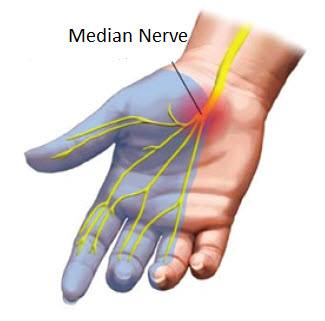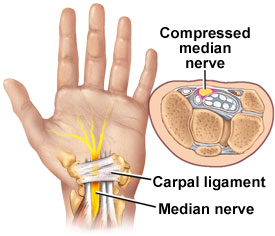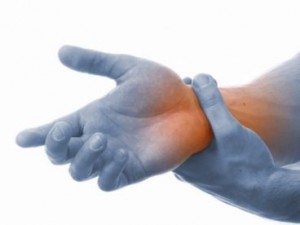Physio Health Advice > Carpal Tunnel Syndrome
What is it?
Carpal Tunnel syndrome is a progressive disorder caused by compression of a key nerve in the wrist. The carpal tunnel refers to a space or “tunnel’ at the front of the wrist where tendons and nerves pass from the wrist to the hand. The median nerve is most commonly affected. This nerve controls sensation to the palm, side of the thumb and fingers, (excluding the little finger). The median nerve also sends impulses to some of the small muscles that allow the fingers and thumb to move.
Signs and Symptoms
Symptoms usually begin gradually with frequent burning, tingling or itching/numbness in the palm of the hand and fingers, especially the thumb, index and middle fingers. Your fingers may feel fat and swollen, even if they aren’t. Symptoms are often relieved by shaking of the wrists, even if only temporarily.
These symptoms may show up during the night as many people sleep with their wrists bent. Gradually, tingling symptoms may increase and grip strength may begin to weaken, which can affect your ability to form a fist, grasp small objects or perform other manual tasks. Left untreated, carpal tunnel syndrome can result in permanent nerve damage.
What causes Carpal Tunnel Syndrome?
Because this tunnel is made from the ligaments and bones of the hand, it is quite rigid, and any thing that causes the narrow space to be taken up can compress the structures that sit within. Often the tendons that pass through the carpal tunnel will become thickened or swollen through overuse, resulting in compression of the median nerve. People who suffer from thyroid or pituitary disorders, rheumatoid arthritis, diabetes, wrist dysfunction, work related stress or use of vibrating tools are more likely to develop this disorder.
Women are three times as likely to develop carpal tunnel syndrome as men, this is thought to be due to smaller wrist dimensions.
How can Physiotherapy help?
Your physiotherapist can diagnose carpal tunnel syndrome with specific tests. Neck pathology can mimic carpal tunnel syndrome and it is important that a correct diagnosis is made. In many cases, symptoms can be resolved with physiotherapy, where you will be advised of rest, wrist splinting, exercises, manual therapy, dry needling and postural changes to prevent further injury.
Physiotherapy treatment is almost always recommended before considering other treatments such as surgical release or cortisone injection and is often very effective, particularly in mild and moderate cases. For more information, don’t hesitate to ask us.
Click here to make an appointment now.



